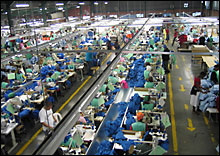To get more orders from global markets, Bangladeshi apparel exporters should concentrate on manufacturing more value added products, South Korean envoy to Bangladesh said.

Bangladeshi textile and apparel industry should move beyond only cutting and stitching and add more value-added products, Ambassador Lee Yun-Young said, while at the inauguration of the Textech trade fair.
He added that it’s time for the Bangladeshi garment exporting industry to move to a new phase and South Korean companies would be ready to support the upgrades.
CEMS-Global USA has organized the four-day 15th Textech Bangladesh 2014 International Expo at Bangabandhu International Conference Centre in Dhaka.
Korean company Daewoo inked a joint venture with Desh Garments in Bangladesh in the late 1970s to export garments for the first time from Bangladesh, the envoy informed.
Korean companies have contributed much to the economic development of Bangladesh since its independence, he said.
He also urged the Bangladesh government to improve business environment in order to attract more foreign investment in to the country.
South Korean companies till date have invested around $600 million in Bangladesh, while over the last five years, Bangladeshi clothing exports to Korea have averagely risen by 69 percent annually, he informed.
Also speaking was Mohammad Hatem, first Vice-President of BKMEA. He also urged foreign investors to invest more in the Bangladesh garment sector.
He said foreign firms can invest in the backward linkages of the clothing industry, since Bangladeshi laws do not permit FDI in cutting and stitching segment.
Atiqul Islam, President of BGMEA was of the opinion that ready-made garment producers will be able to get updated on modern technologies showcased at the fair.
The Bangladesh Industry Minister - Amir Hossain Amu said the Expo will widen scope for foreign firms to enter into partnerships with the Bangladeshi businesses.
In its last fiscal year, Bangladesh earned $24.49 billion from apparel exports alone out of total exports of $30.17 billion.





